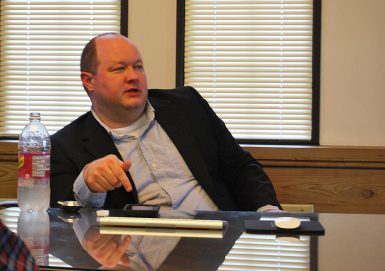Martin, PhD’11, addresses mobile media, political engagement

Journalism alumnus Jason Martin, PhD’11, returned to Ernie Pyle Hall Friday to talk about his latest research on how people use mobile media for political engagement.
Now an assistant professor at DePaul University, Martin addressed the Research Colloquium on “Mobile Media and Political Participation.”
During his first study, Martin found that 23 percent of mobile users accessed election information through the device.
“I think you’re just going to continue to see that increase,” Martin said.
Overall, the mobile users tended to be younger, better educated and female, Martin said. Minorities are likely to be mobile users, he said.
The study showed that mobile usage patterns followed the idea of the democratic divide, Martin said, but the increasing usage by minorities was an interesting finding.
Professor Emeritus David Weaver said the findings suggested that minorities and lower socio-economic populations use mobile media as a tool, even though upper socio-economic groups normally adopt new technology.
“Maybe with mobile, that’s different,” Weaver said.
Martin said in poor areas, the infrastructure for Internet might not be strong or affordable, but a mobile device circumvents those barriers.
A second study explored how mobile media use related to political engagement and the seeking and sharing of information, Martin said.
For the politically engagement, Martin said he found that users were most likely interested in politics and ideology. For users, mobile devices were an important part of seeking information but not for sharing, he said.
Professor Lars Willnat said mobile devices are the new normal, and many people no longer use a desktop or laptop computer. In Asia, he said mobile is the primary way people access online content.
“America is slower,” Martin said, and general usage statistics show that people still use computers but are slowing adopting more mobile technology.
Aside from his work on mobile media, Martin is working with assistant professor Gerry Lanosga to analyze the contest entry questionnaires submitted to Investigative Reporters and Editors for the organization’s annual awards from 1979-2012 to find the attributes of investigative reporting and how its evolved.
More:

